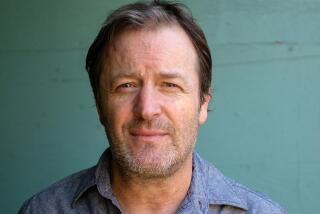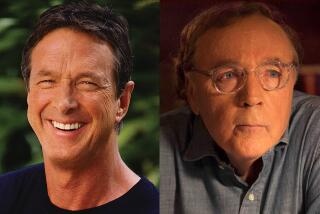John’s Passion : ALL THE PRETTY HORSES <i> By Cormac McCarthy (Alfred A. Knopf: $21; 298 pp.) </i>
When John Cole’s grandfather dies in 1947, leaving the 18,000-acre Texas ranch he spent his life to assemble, the 16-year-old begs his mother to lease it to him. She is determined to sell out; she is an actress, likes a good time and cannot stand the place. So John and his buddy, Rawlins, take two horses, two guns and a little money, and light out for Mexico.
Cormac McCarthy’s “All the Pretty Horses” is the ambitious first part of a trilogy. It tells how John, in love with the disappearing world of horses and infinite horizons, comes violently to manhood in a place and culture where the Old West survives in a Spanish configuration of passion, honor and a sense of the sacramental.
Horses are its heart and John’s passion. He wins his place on a Mexican ranch, and the respect of the wealthy rancher, by breaking 16 wild ponies in four days. His torrid affair with the rancher’s daughter, for which he will pay in blood, is launched when he rides a stallion, steamy from covering a mare, up to her fine-schooled Arabian mount. John is a half-centaur who strives, more urgently than for women, to regain his other half.
It is a mythic urgency. McCarthy is writing an epic about lost values. Horses, freedom, the spirit of the land, the deep and spontaneous humanity of the Mexicans, traditional manly prowess--all these stand in different ways for what has faded from American life. On their way south past highways and whizzing trucks, the boys can’t find oats for their horses; they have to feed them packaged oatmeal dished out in hubcaps.
“Epic” is pretty close to “hiccup” spoken backward. McCarthy wavers between the lovely and the ludicrous. He has written a horse grand opera; Parsifal comes to mind. It is expansively moving at times, and--when the grand opera recedes to more modest but more artful glimpses of riding, horse-taming, Mexicans and boys ruminating--wonderfully engaging. But loftiness gusts like a capsizing high wind, and the writing can choke on its own ornateness. “Horses” is a novel entirely surrounded by language.
Here is a high-temperature rendition of John’s sensibility:
“What he loved in horses was what he loved in men, the blood and the heat of the blood that ran them. All his reverence and all his fondness and all the leanings of his life were for the ardenthearted and they would always be so and never be otherwise.”
Heat becomes meltdown. John “sat a horse not only as if he’d been born to it which he was but as if were he begot by malice or mischance into some queer land where horses never were he would have found them anyway. Would have known that there was something missing for the world to be right or he right in it and would have set forth to wander wherever it was needed for as long as it took until he came upon one and he would have known that that was what he sought and it would have been.”
There is a hyper-inflated hint of Hemingway in this and other cadences, and there is absolute hyper-inflation in the use of Spanish to evoke a Hispanic place and culture. There are numerous two-line, four-line, eight-line exchanges in Spanish, and at one point, nearly a whole page. Spanish words are liberally slipped in, not just in dialogues but in the author’s own voice, and for no apparent reason. John walks past not the room but the “cuarto” where a Mexican is sleeping, for example. In other cases, English is twisted into a Spanish syntax. I wonder how a Spanish translation of “Horses” would be managed.
It would be nice to say that such ornateness and bilingual mannerisms are defects in an otherwise splendid book. They are more than that; they seriously compromise it. But what they compromise is a moving and often enthralling story, a compelling portrait of a young man’s hungers, a profound empathy for a different culture and a sweet skill in portraying it. McCarthy has a cunning narrative sense, except for one section near the end, where John gets his revenge on a brutal Mexican police captain, and movement is brought to a halt by sheer strenuous activity.
As John and Rawlins ride south into Mexico, their happiness in being on horseback and on an adventure, in frying bacon, eating beans out of a can and shooting and cooking a rabbit, their rambling reflections on the universe--all these have a Huck Finn-like buoyancy, with the desert as their river and the horses as a raft. There is humor, subtlety and finally a tragic wildness in a young boy who attaches himself to them, and is finally killed through pure untameability.
McCarthy’s elevated prose does wonders for deserts, mountains, freezing winds, night landscapes and the tangibility of food, a bath and clean clothes. The section in which John, assisted by Rawlins, ropes and breaks a string of wild ponies has an exultant detail in the tradition of Melville’s whale work and clambakes.
Pinpointing the essential of horse-breaking--converting a herd into individuals--the author’s elaborate writing works well. He describes the ponies, some tied, some still racing back and forth, as “coming to reckon slowly with the remorselessness of this rendering of their fluid and collective selves into that condition of separate and helpless paralysis which seemed to be among them like a creeping plague.”
McCarthy has a sure instinct for the worlds of men and their work. He writes with delicacy and art about Mexicans and their culture; a conversation between John and a group of children is grave, comic and supremely perceptive. He can describe the camaraderie in a Mexican bunkhouse, warm and marked by dignified reserve. There is the surreal horror of the Mexican prison in which John finds himself after his affair with Alejandra is revealed to her father, Don Hector, the owner of the ranch, and he is arrested on a trumped-up charge.
The women, on the other hand, are mainly cliches. John’s mother is a wisp of frozen superficiality; the Mexican wives are sentimentally nurturing and deep-rooted. Alejandra is fiery and passionate and not much more; the lovemaking is all temperature and no flesh. Only Alejandra’s great-aunt has an interesting individuality. Her confrontation with John is taut and unexpected, and her condemnation of the lovers is far more than a traditional one.
John himself is partly revealed and partly obscured by McCarthy’s ambitious intentions. There is a disconcerting contrast between his down-home speech and the baroquely elaborate thoughts which the author puts in his head. As a spirited youth seeking out the world, he is convincing and engaging; but he becomes weighed down by McCarthy’s epic plans for him.
For one thing, he is simply too good at everything. He does all the horse-breaking; Rawlins more or less holds the ropes. When they race, he wins and then he wins once more when he and his sidekick exchange horses. He discusses horse-breeding as equal to equal with Don Hector; when he plays chess with the aunt, he beats her two times out of three. Stalked by a professional killer in jail, he prevails in a lethal knife fight. And having bested in different ways the wild horses, Alejandra, Don Hector, the assassin, and a corrupt police captain, he sensitively confesses his moral scruples to a Texas judge who befriends him.
Parsifal, in short; and quite a lot to swallow. At the end, he literally rides off into the sunset, a man now, and ready for a new cycle of symbolic adventures. I would rather like to follow him, but I wish McCarthy would let me travel on foot.
More to Read
The biggest entertainment stories
Get our big stories about Hollywood, film, television, music, arts, culture and more right in your inbox as soon as they publish.
You may occasionally receive promotional content from the Los Angeles Times.










